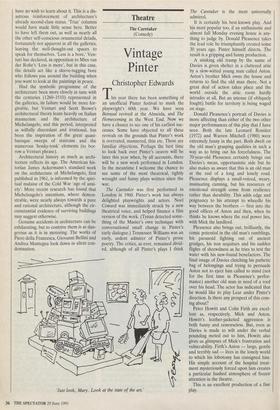Theatre
The Caretaker (Comedy)
Vintage Pinter
Christopher Edwards
This year there has been something of an unofficial Pinter festival to mark the playwright's 60th year. We have seen Betrayal revived at the Almeida, and The Homecoming in the West End. Now we have a chance to see one of his earliest suc- cesses. Some have objected to all these revivals on the grounds that Pinter's work is overrated, mannered, thin etc. These are familiar objections. Perhaps the best time to look back over Pinter's oeuvre will be later this year when, by all accounts, there will be a new work performed in London. In the meantime I welcome the chance to see some of the most theatrical, tightly wrought and funny plays written since the war.
The Caretaker was first performed in London in 1960. Pinter's work has always delighted playwrights and actors. Noel Coward was immediately struck by a new theatrical voice, and helped finance a film version of the work. (Tynan detected some- thing of the Master's own technique with conversational small change in Pinter's early dialogue.) Tennessee Williams was an early, ardent admirer of Pinter's prose poetry. The critics, as ever, remained divid- ed, although of all Pinter's plays I think The Caretaker is the most universally admired.
It is certainly his best-known play. And his most popular too, if an enthusiastic and almost full Monday evening house is any- thing to judge by. Donald Pleasence takes the lead role he triumphantly created some 30 years ago. Pinter himself directs. The result is a gripping and funny production.
A stinking old tramp by the name of Davies is given shelter in a cluttered attic by a slow-witted young man called Aston. Aston's brother Mick owns the house and returns to find the old man there. Not a great deal of action takes place and the world outside the attic room hardly intrudes at all. But an intense (if obliquely fought) battle for territory is being waged on stage.
Donald Pleasence's portrait of Davies is more affecting than either of the two other major performances of this play that I have seen. Both the late Leonard Rossiter (1972) and Warren Mitchell (1980) were extremely funny in the part. Both dwelt on the old man's grasping qualities in such a way as to bring out his forcefulness. The 70-year-old Pleasence certainly brings out Davies's mean, opportunistic side but he also makes us aware that this is an old man at the end of a long and lonely road. Pleasence displays a small-voiced, weary, insinuating cunning, but his resources of emotional strength come from resilience rather than durability. This adds edge and poignancy to his attempt to wheedle his way between the brothers — first into the good offices of Aston and then, when he thinks he knows where the real power lies, with Mick the landlord.
Pleasence also brings out, brilliantly, the comic potential in the old man's ramblings, his paranoid fighting out of ancient grudges, his non sequiturs and his sudden flights of shrewdness as he tries to test the water with his new-found benefactors. The final image of Davies clutching his pathetic bag of belongings and trying to persuade Aston not to eject him called to mind (not for the first time in Pleasence's perfor- mance) another old man in need of a roof over his head. The actor has indicated that he would like to play Lear under Pinter's direction. Is there any prospect of this com- ing about?
Peter Howitt and Colin Firth are excel- lent as, respectively, Mick and Aston. Howitt's leather-jacketed aggression is both funny and remorseless. But, even as Davies is made to wilt under the verbal pounding meted out to him, Howitt also gives us glimpses of Mick's frustration and vulnerability. Firth's Aston — large, gentle and terribly sad — lives in the lonely world to which his lobotomy has consigned him. His simple account of the hospital treat- ment mysteriously forced upon him creates a particular hushed atmosphere of frozen attention in the theatre.
This is an excellent production of a fine play.


















































 Previous page
Previous page